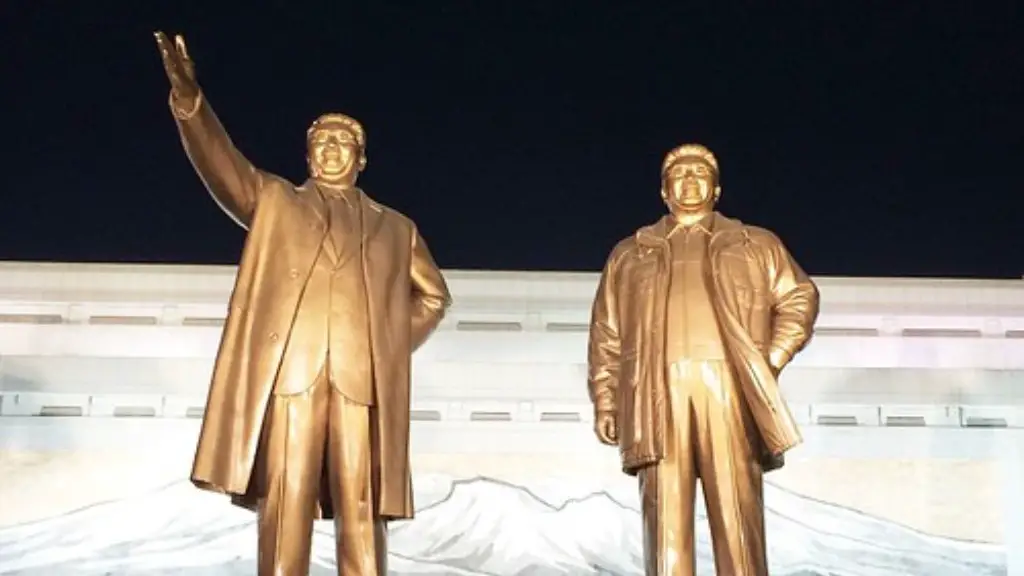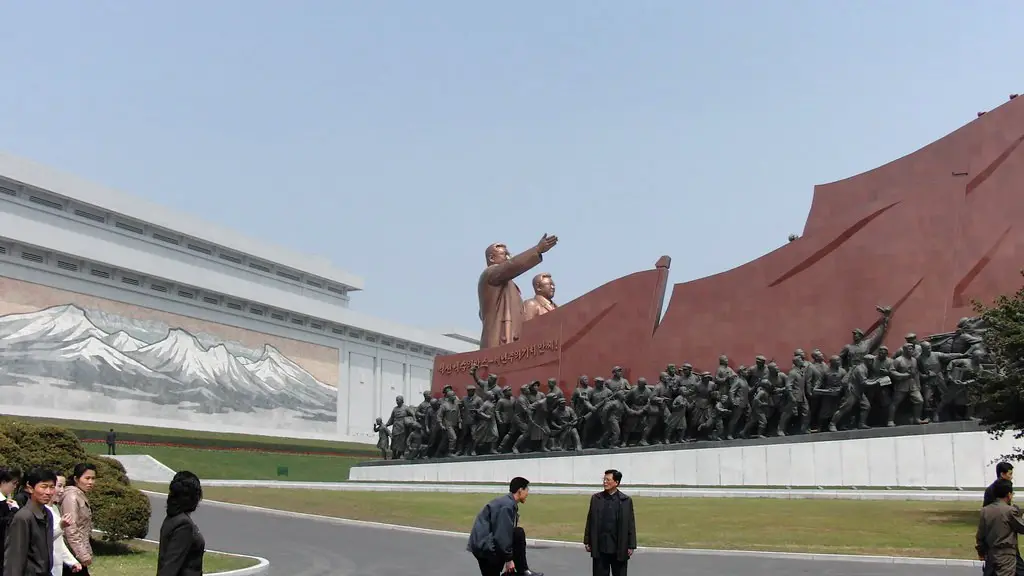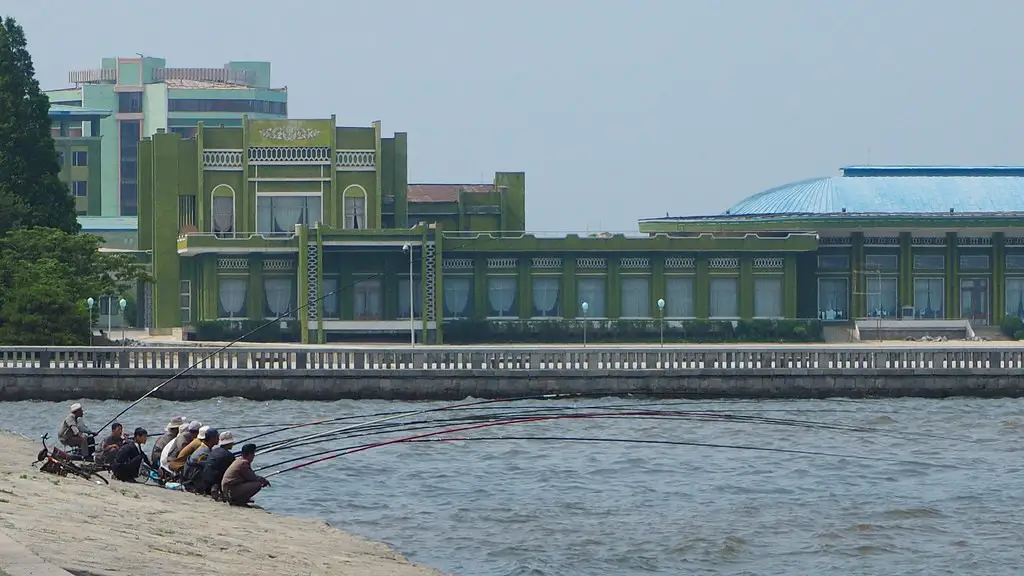Looking at North Korean Motives
The enigma surrounding the North Korean leader has been on the minds of millions across the world ever since he assumed power in 2011. What goes on within the walls of North Korea has largely been shrouded in secrecy, leaving the international community to surmise and interpret the motives of its leaders. As the leader of a socialist republic, much of the North Korean leader’s behaviour is rooted in a Marxist-Leninist ideology and seeks to roll back the effects of capitalism and free markets. His public image as a hard-liner on foreign policy also serves to bolster support among his own people and prevent outside powers from meddling with North Korean affairs.
For the most part, the North Korean leader has been consistent in his policies. His diplomatic moves have largely come in the form of threats and incendiary statements, which have been enough to keep foreign powers at bay. While the Western media has frequently depicted the leader in a harsh light, he has generally followed through on his threats. While it is difficult to tell whether his behaviour is intentional or not, it can be assumed that the North Korean leader desires to maintain tight control over North Korean society, regardless of the cost.
The North Korean leader’s extreme authoritarianism has played a major role in his ability to stay in power. His policies often border on the ridiculous, such as requiring citizens to wear the mandatory ‘Kim Jong Un’ haircut, and enforcing strict rules concerning Internet use. The leader has also been quick to punish those who break the law. The most infamous example is the public executions of his political enemies, which have been used to maintain order and deter other potential opposition figures. While it is easy to point a finger of judgement, it is likely that these actions have been taken out of genuine fear of an overthrow of his government.
The North Korean leader’s relationship with the United States is a complex one. He has been vocal in his criticism of US foreign policy and President Donald Trump, often engaging in a war of words. On the other hand, he has expressed a willingness to negotiate with the US, but these efforts have largely been fruitless. The volatile nature of the relationship is evidenced by the fact that the US and North Korea have often gone from enemies to allies and back again in a matter of weeks or months. It is clear that the North Korean leader wants to maintain his regime, and that he is willing to take whatever steps necessary to protect it.
Understanding North Korean Interests
It is important to understand where North Korea stands in the grand scheme of international affairs. In practical terms, the North Korean leader wants to protect North Korea’s sovereignty, maintain peace and stability on the Korean peninsula, and remain a relevant player on the global stage. In pursuit of these goals, the leader has pursued several official channels, such as a series of United Nations meetings and various diplomatic meetings with other countries, including the US and South Korea.
The North Korean leader has also sought to bolster North Korea’s economic vitality both domestically and internationally. He has pursued economic ties with other countries, such as China and the US, in order to facilitate economic growth. He has also invested in weapons technology and resources to bolster the North Korean military. While these measures may have had a negative impact on the population, it is unclear whether the leader’s decisions in this regard are for their benefit or for his own.
In spite of the international community’s lack of understanding of North Korean intentions, the North Korean leader has been able to outlast and outwit his international adversaries. He has continued to be a thorn in the side of the West, and in doing so has been able to maintain his domestic power.
In spite of this, the North Korean leader is not all-powerful. Over the years, his government has stepped down from nuclear weapons talks, been subject to more stringent UN sanctions, and seen a rise in protests from his own people against the government. As a result, the North Korean leader has had to take a more moderate approach with his foreign policies.
The North Korean Economy and Humanitarian Challenges
The North Korean economy has long been in a state of stagnation, and the leader has had to find creative solutions to invigorate it. After several years of failed reform attempts, North Korea has seen an upswing in some sectors. There have been signs of development in industries such as steel and tourism, suggesting that the North Korean leader’s efforts to reform the economy may be having some effect.
While the leader’s economic policies may have been beneficial in some respects, they have also denied the North Korean people their basic human rights. Humanitarian aid has been blocked from entering the country, and living conditions have continued to deteriorate. The North Korean leader’s focus on militarization has also been detrimental to the country’s economic stability. The result has been a populace that is largely stuck in poverty, and a country that is unable to fully contribute to the global economy.
The North Korean leader’s human rights record has also been called into question. Political dissidents have been subject to imprisonment and torture, and citizens have been denied the right to freely express themselves. While the North Korean leader has made some concessions over the years, such as loosening internet restrictions and introducing market reforms, it remains to be seen whether the government is serious about addressing the human rights issues that plague the country.
The Role of International Sanctions
In response to the North Korean leader’s belligerence, the international community has implemented a number of sanctions. While North Korea is still relatively poor compared to its neighbours, these sanctions have had a significant economic impact. The North Korean people have been hit hardest, as food, fuel and medical supplies have become harder to come by. As a result, many have had to resort to various means of survival, such as selling items on the black market.
International sanctions have also had a political effect. The North Korean leader has become increasingly isolated as a result of these measures, as foreign powers are less likely to deal with him. This has led to a decrease in diplomatic relations with other states, which has further marginalised the country.
Despite this, the North Korean leader has managed to survive the imposition of international sanctions. He has been vocal in his criticisms of the sanctions, equating them to an act of war. While the international community sees these sanctions as necessary to preventing further conflict, the North Korean leader has deployed a combination of bluster and diplomacy to circumvent them.
The Effect of US Foreign Policy
The United States’ foreign policy towards North Korea has been strained over the years. There have been what can only be described as tentative steps towards diplomacy over nuclear weapons, but the two sides have yet to reach an agreement. President Donald Trump has frequently threatened harsh action against North Korea and the North Korean leader, but the two sides have been unable to reach a consensus.
It is likely that the US’ aggressive stance towards North Korea has made it more difficult for the North Korean leader to engage in diplomatic relations. In turn, this has led to an increase in tension between the two nations, as well as an increase in mistrust from both sides. It is clear that the US needs to pursue a more measured approach towards North Korea if it hopes to make progress.
The North Korean leader’s relationship with the US is a complicated one. He has been vocal in his criticism of US foreign policy, and has been quick to dismiss diplomatic overtures from the Trump administration. It is clear that the North Korean leader is devoted to maintaining his rule and protecting his people. It is also clear that the US’ aggressive rhetoric has not helped the situation, and has instead created a situation of mutual distrust. It is up to both parties to put aside their differences and strive for peace.
North Korea’s Place on the World Stage
It is clear that the North Korean leader wants to remain relevant on the world stage. He has sought to secure diplomatic ties with other countries and has sought to bolster his regime. His foreign policy measures have been rash and aggressive at times, but have generally been in line with his goals of maintaining sovereignty and control over North Korean affairs.
The North Korean leader’s leadership has been characterized by a certain amount of instability. His policies have been largely geared towards preventing destabilizing forces from taking control of the country. As such, he has been able to somewhat maintain stability in the face of economic hardship and international sanctions.
The North Korean leader’s legacy is a complicated one. He has been able to maintain his grip on power for nearly a decade, but in the process he has created an oppressive and authoritarian regime. He has been a force for both instability and stability in the region, and it is unclear what the future holds for North Korea.
The Path Ahead for North Korea
The road ahead for North Korea is uncertain. It is clear that the North Korean leader desires to maintain his power, but he is also aware of the need to reform and open up the country. This will no doubt be a difficult task, and it remains to be seen whether the North Korean leader is able to strike a balance between his own interests and those of his people.
The international community must also play a role in North Korea’s path ahead. Diplomacy and cooperation can be a powerful tool in resolving conflicts, and the US and other Western powers must be willing to negotiate in good faith if they hope to reach a peaceful resolution. It remains to be seen whether the North Korean leader is willing to take the steps necessary for a peaceful resolution.
In spite of the uncertainty surrounding the future of North Korea, one thing is certain: the North Korean leader will continue to strive for power and relevance on the international stage. This can only be achieved through compromise and dialogue, and it is up to the international community to work towards a negotiated settlement that is acceptable to all parties.





